World War 1 1914-1920
History
Allies WWI

Originally the coalition of France, the United Kingdom, and Russia in WWI. Allies WWI. The Allies in WWI were nations united against the Central Powers, mainly Germany, Austria-Hungary, and the Ottoman Empire.
Alsace-Lorraine
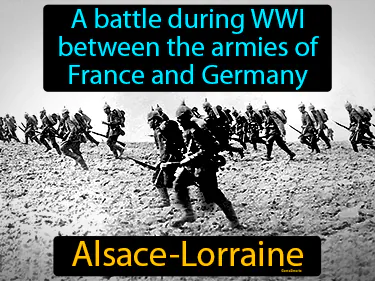
A battle during WWI between the armies of France and Germany. Alsace-Lorraine. Alsace-Lorraine is a region on the border of France and Germany that has been contested between the two countries for centuries.
Alvin York
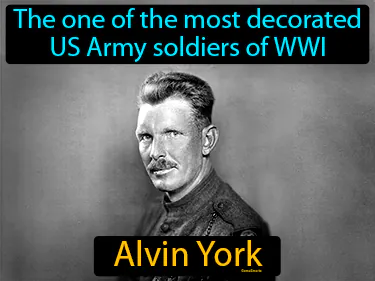
The one of the most decorated US Army soldiers of WWI. Alvin York. Alvin York was a celebrated American soldier known for his heroism during World War I.
American Expeditionary Force
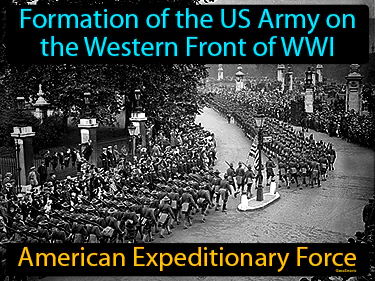
Formation of the US Army on the Western Front of WWI. American Expeditionary Force. The American Expeditionary Force was a group of U.S. soldiers sent to Europe during World War I to help fight alongside the Allies.
Archduke Franz Ferdinand
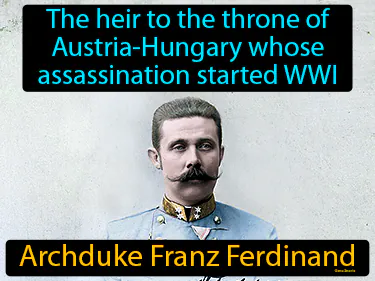
The heir to the throne of Austria-Hungary whose assassination started WWI. Archduke Franz Ferdinand. Archduke Franz Ferdinand was the next in line to rule Austria-Hungary, and his assassination in 1914 triggered the start of World War I.
armistice
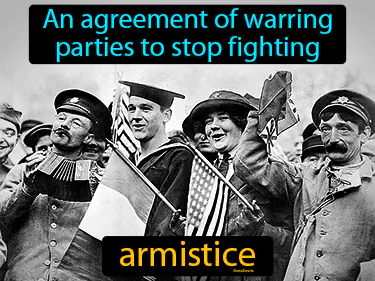
An agreement of warring parties to stop fighting. Armistice. In History, armistice is a temporary pause in conflict where opposing forces agree to cease hostilities.
Bernard Baruch
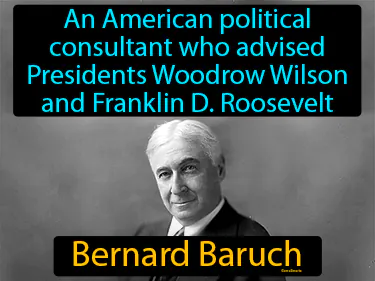
An American political consultant who advised Presidents Woodrow Wilson and Franklin D. Roosevelt. Bernard Baruch was a key economic advisor and influential policy maker in early 20th-century America.
casualty
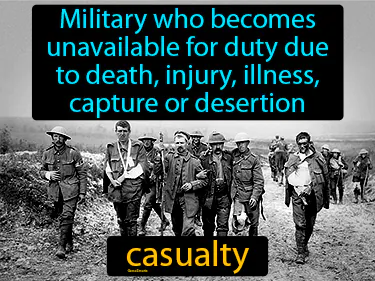
Military who becomes unavailable for duty due to death, injury, illness, capture or desertion. Casualty. In history, a casualty is a person in the military who is unable to continue service because of injury, death, or similar reasons.
Central Powers
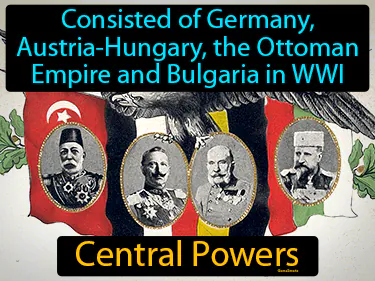
Consisted of Germany, Austria-Hungary, the Ottoman Empire, and Bulgaria in WWI. Central Powers. The Central Powers were the countries that fought against the Allies during World War I.
Committee on Public Information
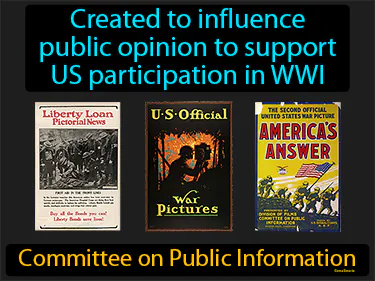
Created to influence public opinion to support US participation in WWI. Committee on Public Information. The Committee on Public Information was a government agency established in 1917 to promote pro-war propaganda during World War I.
conscientious objector
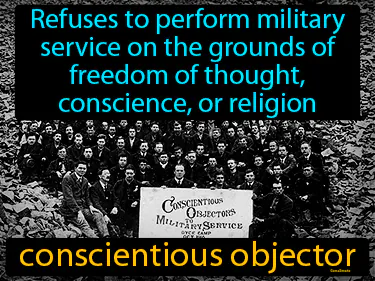
Refuses to perform military service on the grounds of freedom of thought, conscience, or religion. Conscientious objector. A conscientious objector is someone who refuses to fight in wars due to their personal beliefs or principles.
contraband
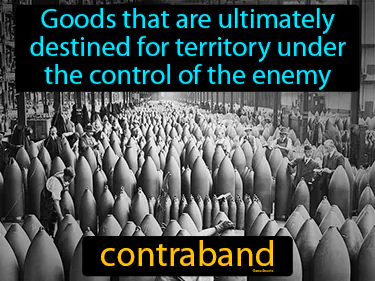
In war, weapons or goods that are going to the enemy. Contraband. In history, contraband refers to items prohibited from being traded or delivered to enemy nations during conflicts.
convoy system

A group of troopships traveling together with a naval escort. Convoy system. In history, the convoy system was used to protect merchant ships from enemy attacks, especially during World Wars, by having them travel in groups with armed protection.
creditor nation

A nation that lends more money to the world than it borrows. Creditor nation. In history, a creditor nation is a country that has a positive net investment position, meaning it is owed more money by other countries than it owes to them.
David Lloyd George
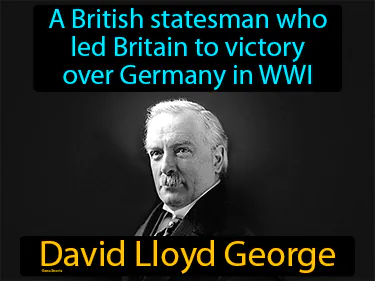
A British statesman who led Britain to victory over Germany in WWI. David Lloyd George. David Lloyd George was the Prime Minister of the United Kingdom during the final years of World War I.
Eddie Rickenbacker

An American fighter ace in WWI and Medal of Honor recipient. Eddie Rickenbacker. Eddie Rickenbacker was a famous pilot who became a hero for his bravery and success in aerial combat during World War I.
Espionage Act

Prohibits interference with military operations and prevents the support of US enemies during wartime. Espionage Act. The Espionage Act, enacted in 1917, is a law that makes it illegal to share information that could harm the US military or help its enemies.
Fourteen Points
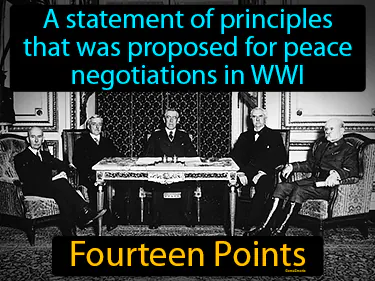
A statement of principles that was proposed for peace negotiations in WWI. Fourteen Points. The Fourteen Points was a plan by U.S. President Woodrow Wilson to establish lasting peace after World War I.
George Creel
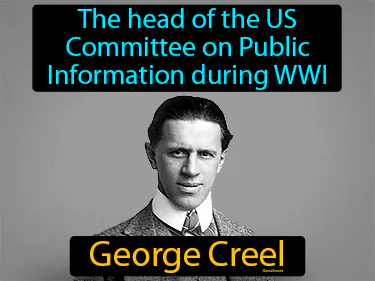
The head of the US Committee on Public Information during WWI, George Creel. George Creel was a journalist who led a government agency to promote American support for WWI through propaganda.
Georges Clemenceau
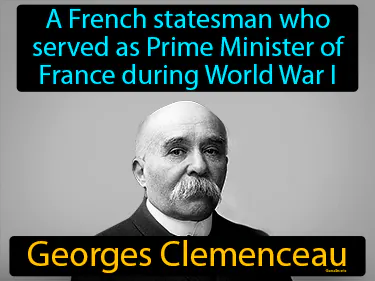
A French statesman who served as Prime Minister of France during World War I. Georges Clemenceau. He was a key leader who helped France win the war and played a major role in the Treaty of Versailles.
Great Migration
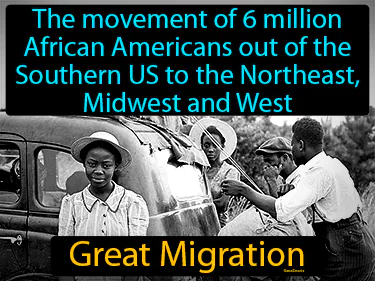
The movement of 6 million African Americans out of the Southern US to the Northeast, Midwest, and West. Great Migration. It was a mass relocation during the early-to-mid 20th century driven by the search for better opportunities and escaping racial segregation.
Henry Cabot Lodge
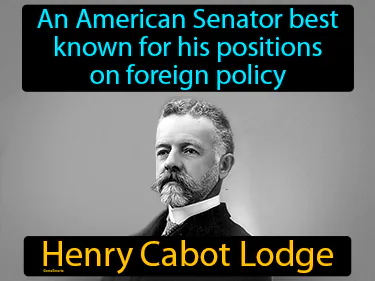
An American Senator best known for his positions on foreign policy, Henry Cabot Lodge. He was a key opponent of the Treaty of Versailles and U.S. participation in the League of Nations after World War I.
influenza

A heavy pandemic of influenza that infected 500 million across the world between 1918 and 1920. Influenza. Influenza is a contagious viral infection that affects the respiratory system and has caused significant outbreaks throughout history.
irreconcilables
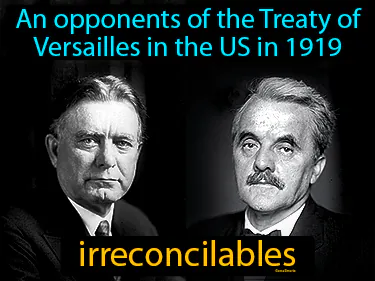
An opponents of the Treaty of Versailles in 1919. Irreconcilables. Irreconcilables were U.S. senators who completely opposed the Treaty of Versailles and refused to support it under any circumstances.
League of Nations
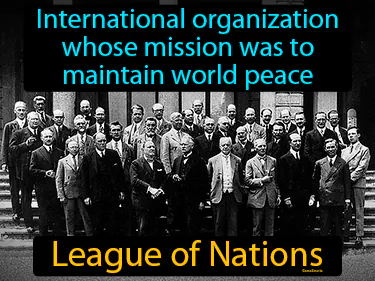
International organization whose mission was to maintain world peace. League of Nations. The League of Nations was the first global group formed after World War I to try and prevent future wars.
Lusitania
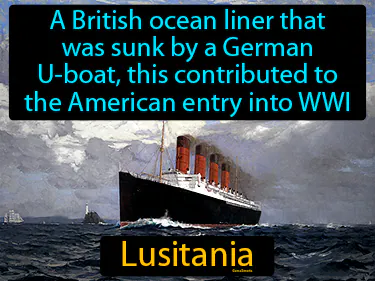
A British ocean liner that was sunk by a German U-boat, this contributed to the American entry into WWI. Lusitania. The Lusitania was a passenger ship whose sinking by Germany in 1915 pushed the U.S. closer to joining World War I.
militarism
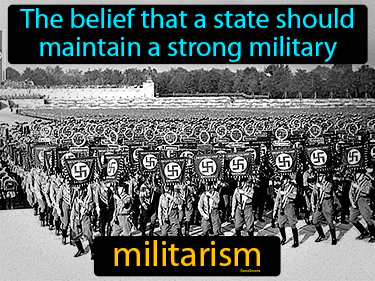
The belief that a state should maintain a strong military. Militarism. In history, militarism is when countries build up their armies and weapons, often leading to conflicts like World War I.
nationalism

An ideology that promotes the interests of a nation with the aim of gaining and maintaining sovereignty over its homeland. Nationalism. Nationalism is when people strongly identify with and support their country, often seeking independence or asserting its power.
no mans land
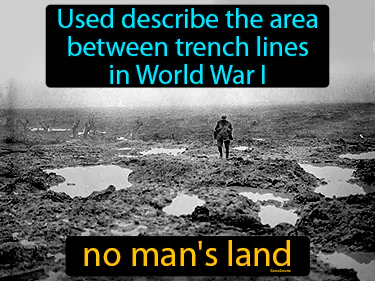
Used to describe the area between trench lines in World War I no man's land. It was a dangerous, barren zone where soldiers from opposing sides did not control the land.
Palmer Raids
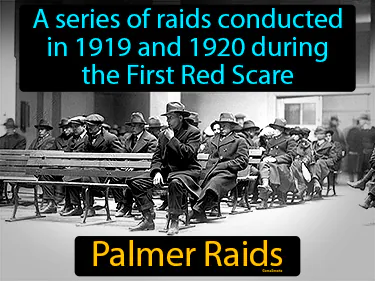
A series of raids conducted in 1919 and 1920 during the First Red Scare. Palmer Raids. The Palmer Raids were government actions that targeted and arrested suspected radicals and anarchists in the United States.
propaganda
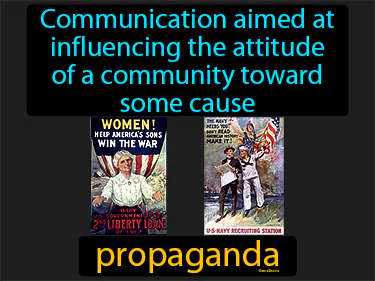
Communication aimed at influencing the attitude of a community toward some cause. Propaganda. In history, propaganda is used to spread information, often biased or misleading, to shape public opinion and achieve a particular goal.
Red Scare

A widespread fear of a potential rise of communism or anarchism. Red Scare. The Red Scare was a period in history when people in the United States were very afraid of communism spreading and influencing the country.
reparations
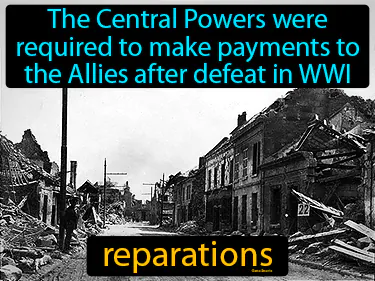
The Central Powers were required to make payments to the Allies after defeat in WWI. Reparations are payments made by a defeated country to compensate for the damage caused during a war.
reservationists
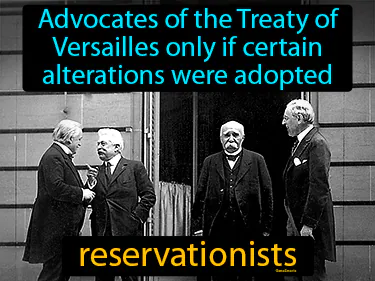
Advocates of the Treaty of Versailles only if certain alterations were adopted. Reservationists. Reservationists were a group of U.S. senators who supported the Treaty of Versailles but wanted changes made to its terms before ratifying it.
Sacco and Vanzetti
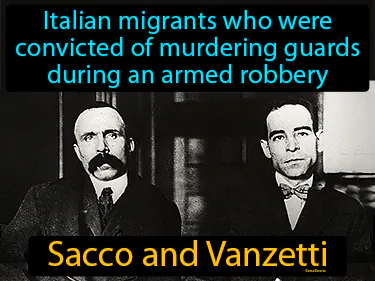
Italian migrants who were convicted of murdering guards during an armed robbery. Sacco and Vanzetti. Sacco and Vanzetti were two Italian immigrants in the United States who were controversially executed in the 1920s, sparking debates about justice and prejudice.
Sedition Act

Extended the Espionage Act to cover a broader range of offenses that cast the war effort in a negative light. Sedition Act. The Sedition Act was a law that made it illegal to criticize the government during wartime.
Selective Service Act

Authorized the US government to raise an army for World War I through conscription. Selective Service Act. The Selective Service Act was a law passed in 1917 that required men to register for military draft to build the US army.
self-determination
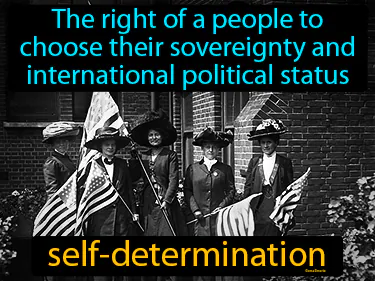
The right of a people to choose their sovereignty and international political status. Self-determination. It is the principle that allows nations to govern themselves and make their own decisions without external interference.
Treaty of Versailles
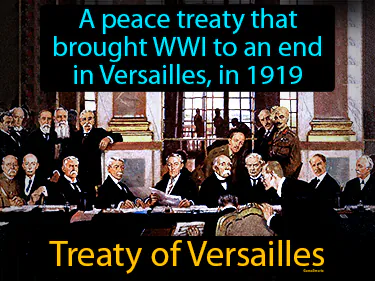
A peace treaty that brought WWI to an end in Versailles, in 1919. Treaty of Versailles. It was an agreement that officially ended World War I, imposing penalties and territorial losses on Germany.
trench warfare
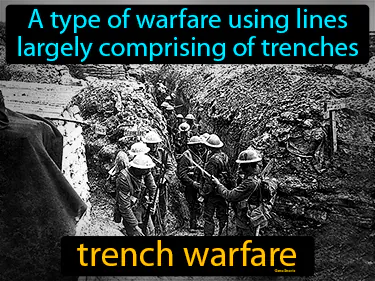
A type of warfare using lines largely comprising of trenches. Trench warfare is a method of combat where opposing armies fight from long, dug-out trenches for protection and strategic advantage.
U-boat
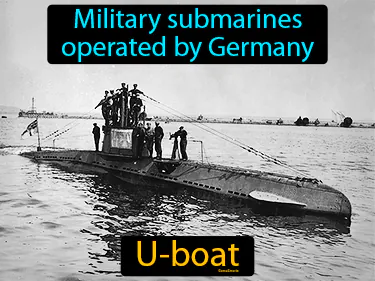
Military submarines operated by Germany. U-boat. U-boats were German submarines used during World War I and World War II to attack enemy ships.
Vladimir Lenin
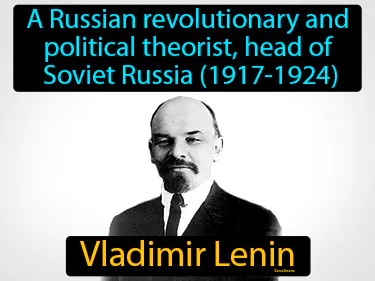
A Russian revolutionary and political theorist, head of Soviet Russia 1917-1924. Vladimir Lenin. He led the Bolshevik Revolution and established the foundation for the Soviet Union.
War Industries Board
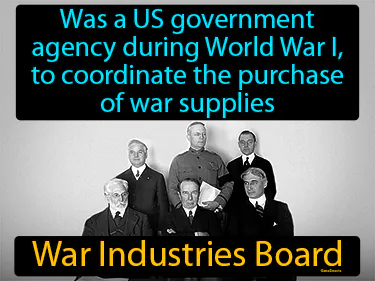
War Industries Board was a US government agency during World War I, to coordinate the purchase of war supplies. It helped ensure factories produced enough materials for the military.
war-guilt clause
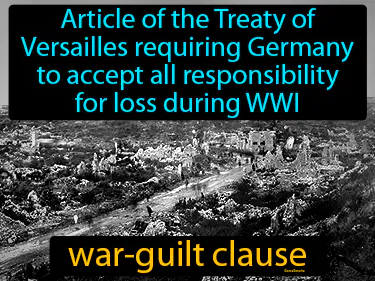
Article of the Treaty of Versailles requiring Germany to accept all responsibility for loss during WWI war-guilt clause. The war-guilt clause forced Germany to admit it was responsible for starting World War I.
Warren G Harding
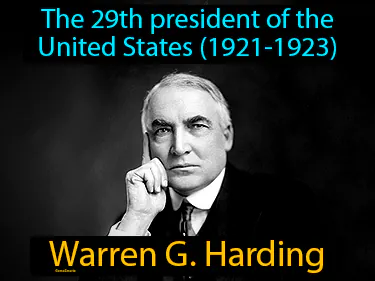
The 29th president of the United States 1921-1923, Warren G. Harding. He is known for his presidency being marked by scandal and efforts to return to normalcy after World War I.
Western Front
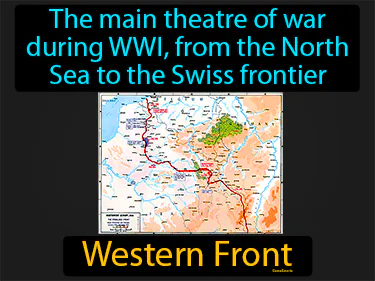
The main theatre of war during WWI, from the North Sea to the Swiss frontier. Western Front. The Western Front was a key battlefield in World War I where much of the fighting between Germany and the Allied forces took place.
Wilhelm II
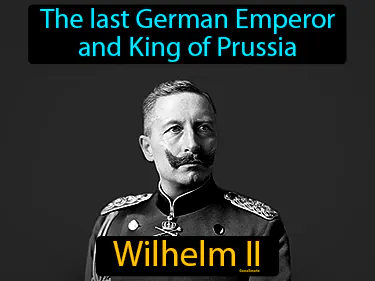
The last German Emperor and King of Prussia. Wilhelm II. Wilhelm II was the monarch whose actions contributed to the events leading up to World War I.
Zimmermann note
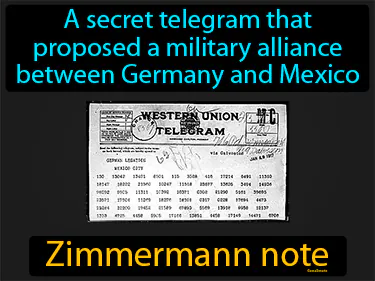
A secret telegram that proposed a military alliance between Germany and Mexico. Zimmermann note. The Zimmermann note was a message from Germany to Mexico during World War I, urging Mexico to join the war against the U.S. in exchange for territory.